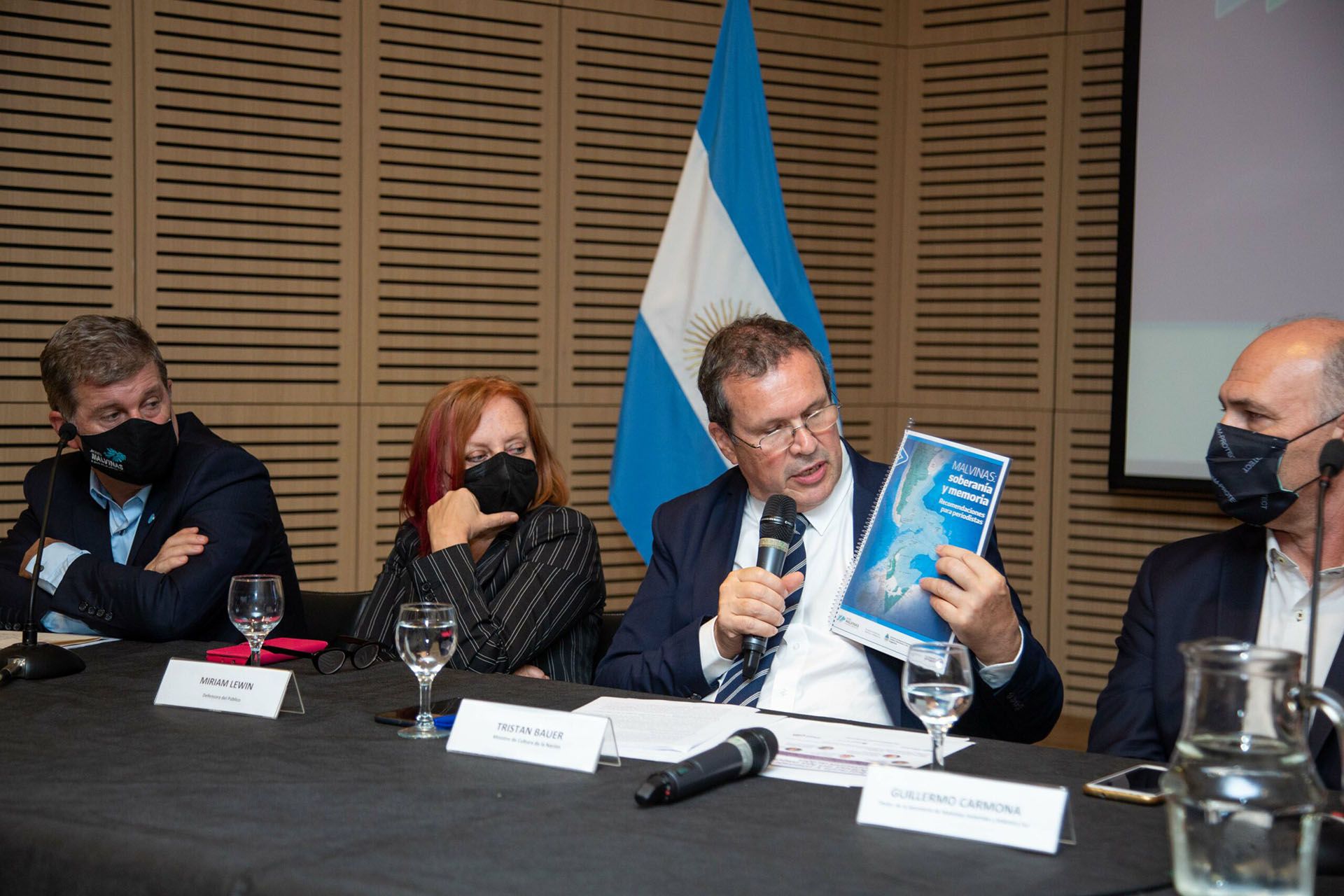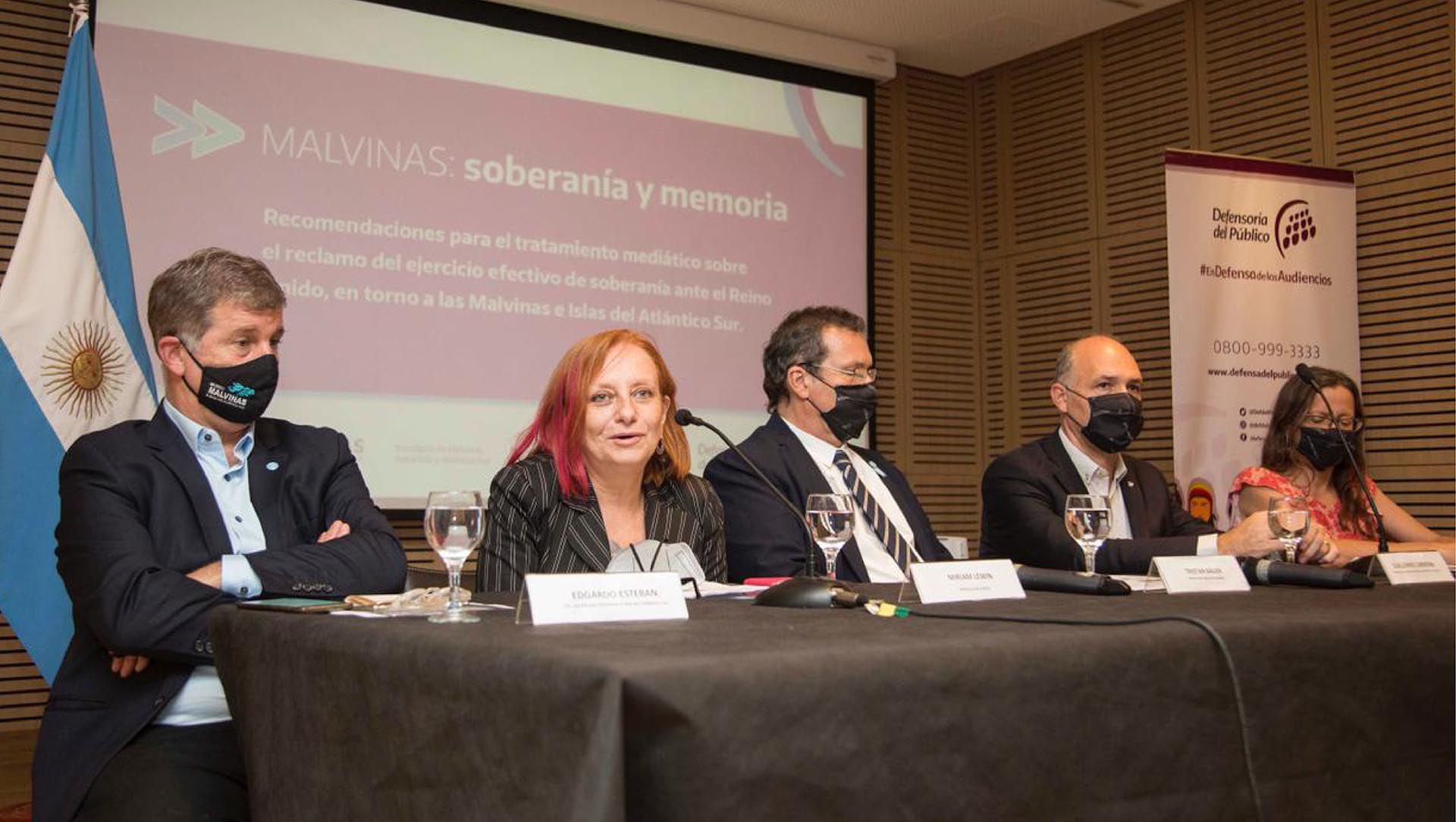
A few days after the 40th anniversary of the Malvinas War, the Office of the Public Defender for Audiovisual Media Services presented a controversial booklet that teaches journalists how to address the issue of island sovereignty.
Entitled “Recommendations for the proper journalistic treatment of the sovereignty dispute with the United Kingdom over the Malvinas and South Atlantic Islands”, the document suggests coverage and ways of dealing with the Malvinas issue in the media.
The presentation of the document took place last Tuesday 15 at the Malvinas Museum headquarters, where in addition to the Public Defender Miriam Lewin, Tristán Bauer, Minister of Culture of the Nation; Guillermo Carmona, head of the Secretariat of Malvinas, Antarctica and South Atlantic; Edgardo Esteban, Director of the Malvinas and South Atlantic Islands Museum; and María Laura Guembe, UBA researcher and teacher.
“Sometimes it is difficult to find the boundary between audiovisual, networks and internet portals,” Carmona summarized, referring in this way to how the media treated how the United Kingdom had appointed the new governor. “It is to rethink how the Malvinas issue is addressed. There is a problem here: because if there is a female governor, she is an illegitimate governor,” he summarized.
Officials in attendance highlighted that the booklet serves as “tools to detect some of the most common forms of incorrect, imprecise or disrespectful approach.” At the same time, they stressed that it investigates the characteristics that “responsible coverage with a focus on sovereignty and memory” should have. They even asked to read the Falklands in terms of “usurpation”.

The controversy of this approach focuses on the fact that although Argentina has regional support and other countries outside the Americas, none of these governments - except the few that share these ideological traits, such as Cuba and Venezuela - accuse Britain of being usurper or colonialist. That is, they support the claim, but they avoid the rhetoric that the booklet asks for.
Among the suggestions made on the 14 pages of the document, there is one that claims to no longer call the islanders “kelpers” because it belittles them because it is an adjective used by the English. In addition, from now on, the current authorities of the islands must be referred to as “illegitimate rulers”, “illegitimate” of the islands or “intended authorities”.
While it is true that most of its ten recommendations coincide with what international law recognizes for Argentina in its historic claim to sovereignty of the Malvinas, it also inhibits alternative or different thinking about the conflict. Should a journalist who does not respect that guideline be called antihomeland or pro-British?
The document also seeks to highlight the allegedly positive aspects of Cristina Kirchner's government with regard to the Malvinas issue. He argues, for example, that in 2012, unidentified Argentine remains in the Falklands began to be claimed for DNA. Although this is true, the procedures were only unblocked in 2016 under the government of Mauricio Macri.
Another aspect of the official document is that it stresses that the inhabitants of Malvinas “do not constitute a sovereign people with the right to self-determination”. He emphasizes that it is a “population established by the colonial power itself after it occupied the islands by force and expelled the Argentine authorities in 1833″.

The booklet claims to change the entire toponymy of the islands into Spanish. For example, it requires calling the capital as Puerto Argentino and not otherwise; in addition to Mount Pleasant as Monte Agradable and so on.
Despite the fact that the Spanish translation of the places was an ancient measure imposed by the dictatorship of Leopoldo Fortunato Galtieri, the booklet distances itself from the facts by saying that at that time the country was “governing by an illegal and illegitimate military dictatorship, which acted with its back to the Argentine people and departing from traditional commitment of Argentina to the principle of peaceful settlement of international disputes and, in particular, to the search for a peaceful solution to the Malvinas question”.
This is not the first time that the body led by Miriam Lewin has tried to want to control the content that is broadcast on the media and social networks. There had already been a great rejection of the creation of the Nodio Observatory, which was described as “a trap for journalism”.
KEEP READING:
Últimas Noticias
Debanhi Escobar: they secured the motel where she was found lifeless in a cistern
Members of the Specialized Prosecutor's Office in Nuevo León secured the Nueva Castilla Motel as part of the investigations into the case

The oldest person in the world died at the age of 119
Kane Tanaka lived in Japan. She was born six months earlier than George Orwell, the same year that the Wright brothers first flew, and Marie Curie became the first woman to win a Nobel Prize

Macabre find in CDMX: they left a body bagged and tied in a taxi
The body was left in the back seats of the car. It was covered with black bags and tied with industrial tape
The eagles of America will face Manchester City in a duel of legends. Here are the details
The top Mexican football champion will play a match with Pep Guardiola's squad in the Lone Star Cup

Why is it good to bring dogs out to know the world when they are puppies
A so-called protection against the spread of diseases threatens the integral development of dogs




